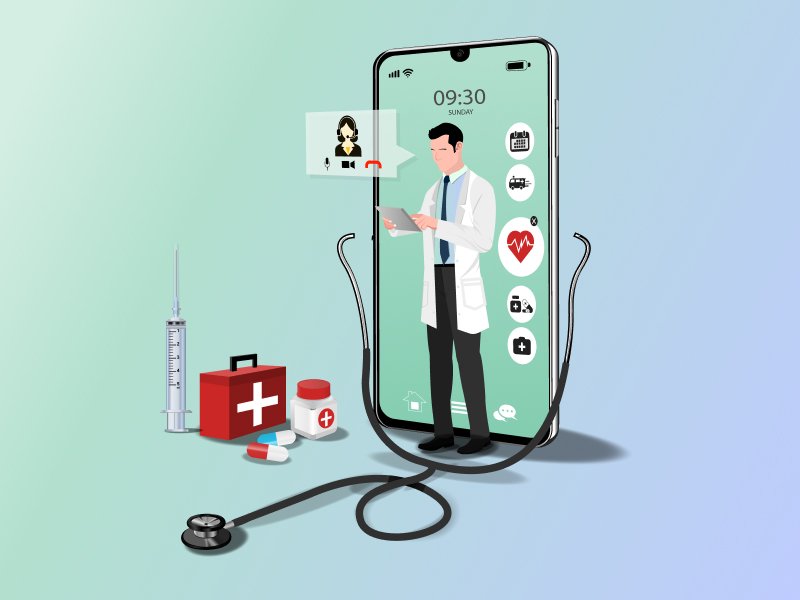
The healthcare sector is undergoing a digital transformation, driven by advancements in technology that are reshaping how medical app development company operate and deliver value. As patients increasingly demand convenience, personalized care, and real-time access to their health information, medical app development companies are leveraging cutting-edge technologies to create solutions that meet these expectations. In this article, we will explore the key technologies shaping the future of medical app development companies and how they are influencing the industry.
1. Artificial Intelligence (AI) and Machine Learning
AI and machine learning are among the most transformative technologies impacting medical app development. These technologies enable apps to analyze vast amounts of data quickly, leading to improved diagnostics, personalized treatment plans, and predictive analytics. Medical app development companies are utilizing AI for various applications, such as:
- Predictive Analytics: By analyzing patient data, AI can predict potential health risks, helping healthcare providers take proactive measures. For example, an app can analyze historical data to alert patients about upcoming appointments or the need for preventive screenings.
- Personalized Medicine: AI algorithms can tailor treatment recommendations based on individual patient data, leading to more effective and personalized healthcare solutions.
- Chatbots and Virtual Assistants: AI-powered chatbots can assist patients by answering queries, providing medication reminders, and even offering mental health support. This enhances patient engagement and streamlines communication between patients and healthcare providers.
2. Telemedicine and Telehealth Solutions
The COVID-19 pandemic accelerated the adoption of telemedicine, making it an essential component of modern healthcare. Medical app development companies are focusing on creating telehealth solutions that allow patients to connect with healthcare providers remotely. Key features include:
- Video Consultations: Apps now integrate secure video conferencing tools that allow for face-to-face consultations without requiring patients to visit healthcare facilities.
- Remote Patient Monitoring: Devices and apps can monitor patients’ vital signs in real-time, alerting healthcare providers to any abnormalities. This is particularly useful for chronic disease management, enabling timely interventions.
- Health Information Exchange (HIE): Telehealth apps often include HIE features, allowing seamless sharing of patient data across different healthcare systems, which improves continuity of care.
3. Internet of Medical Things (IoMT)
The Internet of Medical Things (IoMT) encompasses connected devices that gather and transmit health data. Medical app development companies are harnessing IoMT to create applications that integrate data from various medical devices, enhancing patient care and operational efficiency. Some benefits include:
- Real-time Data Collection: Wearable devices and home monitoring systems can continuously collect data, providing healthcare providers with a comprehensive view of a patient’s health status.
- Enhanced Decision-Making: By aggregating data from multiple sources, medical apps can provide insights that help healthcare providers make informed decisions regarding patient care.
- Improved Patient Compliance: IoMT devices often include features that remind patients to take medications or follow treatment plans, improving adherence to prescribed therapies.
4. Blockchain Technology
Blockchain technology is making its way into the healthcare sector, offering solutions for data security and interoperability. Medical app development companies are exploring blockchain to address challenges such as:
- Data Security and Privacy: Blockchain provides a decentralized ledger that can securely store patient records, ensuring that sensitive health information remains private and tamper-proof.
- Interoperability: By using blockchain, medical apps can facilitate secure data sharing between different healthcare systems, allowing for a more integrated approach to patient care.
- Smart Contracts: These self-executing contracts can automate processes such as billing and insurance claims, reducing administrative overhead and improving efficiency.
5. Augmented Reality (AR) and Virtual Reality (VR)
AR and VR technologies are being increasingly integrated into medical app development, offering immersive experiences for both patients and healthcare professionals. Applications include:
- Medical Training and Education: VR simulations can provide medical students and professionals with realistic training scenarios, enhancing their skills and confidence before working with real patients.
- Patient Engagement: AR applications can help patients visualize their treatment plans or understand complex medical procedures, fostering better communication between patients and healthcare providers.
- Pain Management and Therapy: VR experiences can be used as therapeutic tools to manage pain and anxiety, providing distraction and relaxation during medical procedures.
6. Cloud Computing
Cloud computing is revolutionizing how medical app development companies store and manage data. By leveraging cloud technologies, companies can achieve greater scalability and flexibility. Key advantages include:
- Data Accessibility: Cloud-based solutions enable healthcare providers to access patient information from anywhere, improving collaboration and decision-making.
- Cost Efficiency: Medical app development companies can reduce infrastructure costs by utilizing cloud services, allowing them to allocate resources to developing innovative solutions.
- Real-time Updates: Cloud platforms facilitate continuous updates and maintenance, ensuring that medical apps remain compliant with the latest regulations and technologies.
7. Data Analytics and Big Data
The ability to analyze vast amounts of data is crucial in healthcare. Medical app development companies are utilizing data analytics and big data technologies to extract meaningful insights from patient data. This has several implications:
- Population Health Management: By analyzing data across populations, healthcare providers can identify trends, manage disease outbreaks, and improve public health initiatives.
- Operational Efficiency: Data analytics can help optimize workflows within healthcare organizations, identifying bottlenecks and improving resource allocation.
- Enhanced Patient Outcomes: By leveraging data analytics, medical apps can provide personalized insights and recommendations, ultimately leading to better health outcomes for patients.
8. Integration with Electronic Health Records (EHR)
Medical app development companies are increasingly integrating their solutions with Electronic Health Records (EHR) systems. This integration streamlines data sharing and enhances the continuity of care. Benefits include:
- Comprehensive Patient Profiles: Integrating with EHRs allows medical apps to provide healthcare providers with a holistic view of a patient’s medical history, facilitating more informed decision-making.
- Improved Workflow: Automated data entry and retrieval can reduce administrative burdens, allowing healthcare professionals to focus more on patient care.
- Regulatory Compliance: EHR integration helps ensure that medical apps adhere to regulatory requirements, safeguarding patient data and promoting best practices in healthcare.
Conclusion
The future of medical app development companies is being shaped by a myriad of technologies that enhance patient care, improve operational efficiency, and drive innovation in healthcare. From AI and telemedicine to IoMT and blockchain, these technologies are enabling companies to create solutions that not only meet the evolving demands of patients but also improve the overall quality of care. As the healthcare landscape continues to evolve, medical app development companies must stay at the forefront of these technological advancements to deliver effective, user-friendly, and secure applications that empower both patients and healthcare providers. The integration of these technologies will not only revolutionize the industry but also pave the way for a more connected, efficient, and patient-centric healthcare ecosystem.






